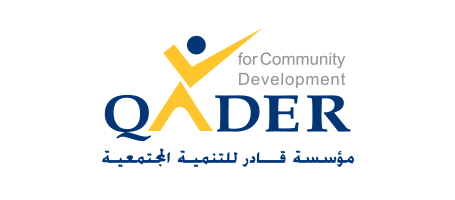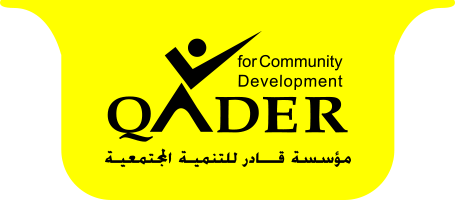Addressing the social needs of Persons with Disabilities (PwD) through the Local Authority
General Background
Since 2009, QADER has worked with 6 local authorities in Bethlehem, Hebron and Jericho governorate, to implement a development model to address the needs of disabled citizens within the Palestinian Municipalities Support Program (PMSP) strategy. The project is funded by the Italian Ministry of Foreign Affairs, within the Ministry of local Government framework in participating in the social development of PwD, in partnership with the Ministry of Social Affairs, as the main objective is realizing the rights of persons with disabilities and responding to their needs in accordance with related laws and legislations.
This model is based on introducing and developing the local authorities’ role and main functions to cooperate with all relevant parties, and work on planning and coordinating to the disability sector, in the perspective of human rights and development for the advancement of PwD and improve the services provided to them, in addition to contribution to their integration in society and their access to all opportunities and possibilities and enjoyment of all their rights and live in dignity on an equally with other citizens.
This model is implemented with Samou’, Idna, Yatta, Halhoul, Beit Fajjar, and Jericho municipalities, based on the decisions of the municipal councils to work in the social sector, particularly in the disability sector. The social services departments were established to institutionalize this work permanently and continuously, to become an integral part of the employment system and jurisdiction in the above mentioned municipalities.
The most important developmental aspects is developing the community services departments, and its inclusion in the municipal structure, to introduce PwD issues in the strategic plans and annual budgets for each municipality, in addition to the adoption of policies and procedures that take into account the needs and rights of PwD at both internal and external level related to the services provided.
Within the projects, part of the budget is dedicated to the implementation of an income-generating project to cover the community center expenses after the end of the project for each municipality.
About Community Services Departments:
The importance of social services departments is in the institutionalization of the social sector, especially in addressing the needs of PwD, as the establishment of these units is one of the obligations upon the six municipalities in accordance with the other obligations the municipalities committed to with the funder when obtained the project grant. The social services units undertake the following tasks and specialties:
- Planning for needs assessment process in disability sector that includes related governmental and non-governmental institutions.
- Facilitating, organizing and leading the collaboration among relevant institutions play a supportive and coordinating role to the work of the social services unit in each municipality, in addition to promoting team work and coordination to avoid duplication in providing the different services and to ensure equitable distribution.
- Support the collaboration between the institutions to forma specialized coordinating committees, designed to work with various groups to implement specific activities and programs within the agreed plans and strategies.
- Implementing the municipal strategies and policies in the social sector that serves the municipal and public interest, while establishing and developing annual plans to implement these strategies and policies.
- To build, develop and maintain a good relationship with all relevant institutions that serve the municipal policy and strategy in the social sector.
- Supervising and managing the municipal social services and ensure high-quality services, and make recommendations on their development and expansion.
The services provided by the community Centers:
Children with severe disability: This department provides services to children with severe disabilities according to a new methodology known as MOVE, which is based on the principle that “movement is the cornerstone to learning, and we learn by exploring the world around us.” The MOVE program assists children and adults with and complex disabilities.
Special Education: Every child is diagnosed by a specialist who examines his/her mental abilities to determine the degree of disability. A preliminary evaluation is conducted on job performance, the abilities and skills of daily life (personal care skills and independence skills), communication skills, and social skills to determine the abilities of the child. An educational plan is prepared for the children, pertaining to the achievement of a number of secondary goals that lead to the realization of the main goals part of the individual education plan, in addition to a behavior modification plan. The aim of this program is to teach children and provide them with training so that they are able to depend on themselves and able to integrate in ordinary government schools and in society.
Speech-Language Therapy: This domain specializes in issues related to conversation, communication and swallowing among children and adults. It is considered a relatively new field in medicine, especially in the Arab World, as it was first practiced in the middle of the last century. Speech and conversation specialists are considered among the health services specialists who provide support to those who work with beneficiaries and their caregivers, in addition to teachers, doctors, nurses, physiotherapists and occupational therapists.
Physio and occupational Therapy: This is considered among the most important practices in medicine. It provides services to individuals to develop, maintain and restore their movement to the maximum and increase their occupational abilities in all stages of life.
Services are provided under circumstances when movement is threatened due to ageing, injuries, diseases, or environmental factors. Physiotherapy involves determining and improving the quality of life and the ability to move through the employment of prevention, intervention, habilitation and rehabilitation methods.
Psycho-social support: Social and mental support can move persons with disabilities and their families from isolation to integration and from dependence to independence and productivity. It may also contribute to the creation of a new form of awareness in the community towards persons with disabilities and marginalized individuals, and play a role in promoting social responsibility towards dealing with individuals, families and groups in need of support.

